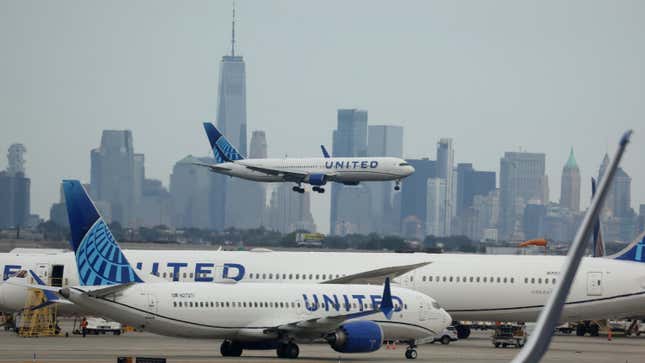
United Airlines expects its capacity growth to slow in the coming years, thanks to the drama at its biggest aircraft supplier, Boeing.
Many of the airplanes United bought from Boeing that were supposed to be delivered this year are the very same model that’s causing the industry headaches: the 737 Max 9. That Boeing model was grounded on Jan. 6 due to issues with the manufacturing and design of an airplane part called a door plug. The problems began when a door plug blew off a Max 9 during a tumultuous Alaska Airlines flight the day before.
Nearly one third of United’s aircraft deliveries scheduled for 2024 are 737 Max 9s. Looking beyond 2024, the carrier had also planned to buy 277 of Boeing’s latest model, the Max 10, over the next decade. Now United is having to adjust its “fleet plan,” the airplanes it’s buying for future use.
The shakeup comes just as the company reached a record 171 million customers last year, with capacity in the fourth quarter up 22% from 2022.
But, Leskinen said, “With the Max grounding, this is the kind of straw that broke the camel’s back with believing that the Max 10 will deliver on the schedule we had hoped for.”
United CEO Scott Kirby clarified that the company isn’t canceling its Max 10 orders. Instead, it’s taking those aircraft“out of [its] internal plan” and preparing to operate without them. “We’ll be working on what that means exactly,” Kirby said. “Boeing’s not going to be able to meet their contractual deliveries on at least many of those airplanes.”
Kirby was adamant that United is Boeing’s “biggest cheerleader,” while pushing the company to fix the problems with its 737 Max 9s “even faster.”
One thing is clear: The future of United’s fleet remains uncertain. Right now, almost 80% of the airline’s in-service airplanes are Boeings.
More than half of those are 737s, and 79 are 737 Max 9s.
Thanks to the grounding of its current fleet of Max 9s, United anticipates a loss of 35 cents to 85 cents per share during the first quarter, more than Wall Street analysts expected.
United still hits the sweet spot
United is managing to rally investors despite the trouble with its biggest aircraft supplier. Shares rose 7% to $41 on Tuesday. That’s not totally surprising, given that the carrier’s fourth-quarter earnings beat forecasts. United reported revenue of $13.6 billion, up 10% from the same period in 2022.
“Despite unpredictable headwinds, we delivered on our ambitious EPS target that few thought possible—and set new operational records for our customers,” CEO Kirby said. “Looking ahead, we expect these trends to continue, and United is incredibly well positioned to capitalize on them and to deliver on our short and long-term financial targets.”